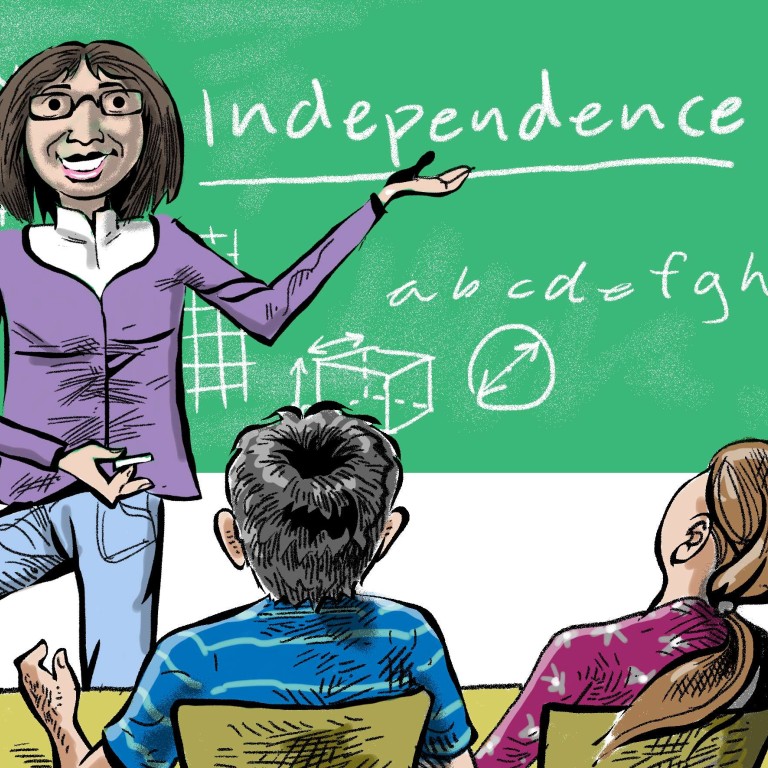
Why Hong Kong schools provide an ideal platform for discussion of independence, and other contentious issues
Kerry Kennedy says educational establishments offer a controlled environment for rational and open debate – the hallmark of a tolerant and just society – in stark contrast to social media where hate and prejudice thrive

A more rational attitude is needed to encourage the community not to be afraid of new ideas, to enter into respectful but nevertheless spirited debate and to resolve issues not by the heavy hand of bureaucracy and government but through deliberation and open discussion.

Teachers’ personal views about any topic should not influence what they teach, who they teach or how they teach
For example, recently, localist supporters promoted a public television viewing of an Olympic badminton match between Hong Kong and mainland Chinese players in order to jeer at the China players and cheer the Hong Kong team. This is populism at its worst. It is similar to the anti-immigration discourse that characterised much of the UK’s Brexit debate and the anti-Mexican and anti-Muslim discourse that is at the forefront of Republican Donald Trump’s presidential campaign.
Different brands of localism need to be distinguished and some need to be extinguished because they do not reflect a true democratic spirit. Racism and social discrimination have no place in a democratic society and those supporting such social practices need to be called out not as “localists” but as “populists” seeking to spread hatred and fear.

‘Students can discuss anything under guidance of teachers’: Hong Kong education minister breaks silence on independence talk on campus
Teachers who should be able to expose this kind of weakness in the current localist discourse have recently been reminded that their role is not to “preach” independence in their classrooms. Of course, this is correct, and why the group of school principals responsible for this warning felt it was necessary is not clear.
Teachers’ roles in relation to political issues have been the subject of local legislation since colonial times. Teachers’ professional ethics, both in Hong Kong and internationally, adhere to this principle. Teachers’ personal views about any topic should not influence what they teach, who they teach or how they teach. Yet this does not mean that controversial issues such as independence and self-determination should not be discussed.
Any lesson on the Basic Law or “one country, two systems” cannot avoid referring to what is a topic discussed daily in the media, among peers and in families. Schools have a special role here to ensure that the debate is open, fair and respectful, and based on evidence, not opinion and prejudice.
There need to be safe environments for this kind of discussion and, if schools do not provide them, then the discussions will take place elsewhere without rules, without refereeing and with no way to avoid hatefulness and disrespect for those with different views. This alternative unsupervised platform for discussion is provided by social media that is used extensively by a younger generation seeking information and ideas.
Banning discussion of controversial issues is not the way to achieve a tolerant and just society
Sending ideas underground, or in the current context to social media, will only ensure that they are discussed more. Yet social media platforms are usually without the benefit of any adjudication or moderation that might come when controversial ideas are discussed in public spaces where different views can be aired safely and where young people can learn to respect views with which they do not agree. Deliberation is an important part of democratic culture. Banning discussion of controversial issues is not the way to achieve a tolerant and just society committed to open debate and exchange of ideas.
Some countries have sought to rid the nation of ideas the regime did not like and so burnt books that did not support its ideology. Books are easily burnt; but ideas persist and cannot be removed so easily. Ideas continue, no matter what means are used to try to eradicate them.
Author Zha Jianying says Hong Kong stands ‘at a crossroads, confronting a crisis’
Hong Kong lies at a crossroads. It can draw on its democratic heritage and aspirations that will encourage open and informed debate on controversial issues. This would provide young people with the opportunity to engage in public discussion about the issues that are most affecting them.
Alternatively, ideas concerning controversial issues can be banned from public discussion, as happens in authoritarian societies. Historically, democracy has trumped rightist politics. Yet, in the current environment, both locally and internationally, there are no guarantees.
Yet, for the sake of young people’s future, we should try to ensure that rational thinking, tolerance and a commitment to talk together will win the day.
Professor Kerry Kennedy is a senior research fellow in the Centre for Governance and Citizenship at The Education University of Hong Kong

